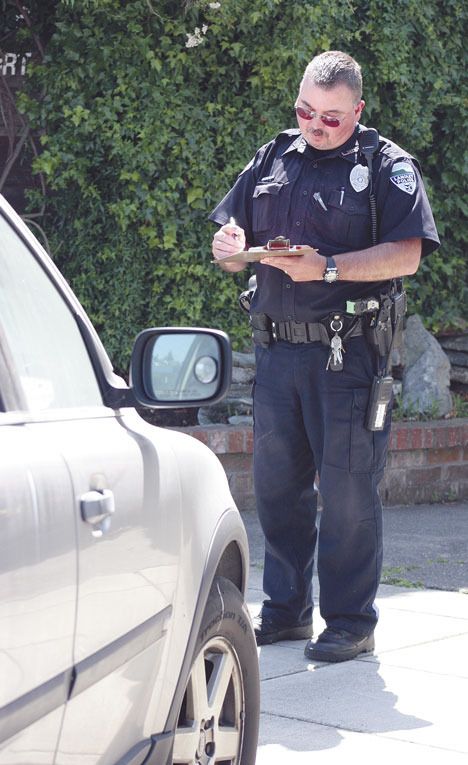Summer’s around the corner, and it’s looking for a place to park in Langley.
Tourist visits are increasing, and the city is beefing up it’s typically lackadaisical downtown parking enforcement.
“Compared to the oil spill in the Gulf, it’s a minor problem,” Fred Lundahl, president of the Langley Chamber of Commerce, said Monday.
“But it’s a big problem to a shop owner when somebody else’s employees are parked in front of his store all day,” he said.
Some downtown employees are parking as close to work as they can get, often all day in designated four-hour spots, Lundahl said.
That means parking places are being tied up that could be used by visitors and potential paying customers, he said.
City officials have responded with a tire-chalking campaign coupled with bright orange warning slips, and the promise of a $25 ticket for those failing to take the hint.
Most of the downtown parking spaces have a four-hour limit, and a few have 30-minute and 15-minute limits. Some areas also are designated for loading and unloading.
“What you have is parking places in short supply, plus high demand and businesses that have employees,” Lundahl said.
He said the city of Coupeville, experiencing a similar problem, determined that each parking space unavailable to customers resulted in a loss of about $650 a month in sales-tax revenue.
“It make so much sense, I haven’t found anybody opposed to it,” Lundahl said of the philosophy of reserving parking for potential customers.
The Langley chamber and the city are trying to get employees to park in nearby off-street areas, or on streets outside the business core.
Lundahl said the chamber and the city have adopted a communicative approach, backed by the threat of enforcement, to try to convince people working in town to park elsewhere.
He said it’s a departure from the city’s usual approach, which has been more or less to ignore parking violations in the U-shaped downtown core, roughly encompassing First and Second streets and Anthes Avenue.
“Parking is one of those things we’re constantly looking at and trying to improve,” Mayor Paul Samuelson said Monday.
“It’s an education process,” Samuelson said. “I don’t think people are doing it to cause a problem; they just don’t think about it.”
A letter signed by Samuelson and Police Chief Bob Herzberg was distributed this past week to all downtown merchants explaining the situation and the city’s intent.
The letter said surveys indicated there are 250 employees working in downtown Langley, which has about 200 on-street parking spaces.
“The simple math demonstrates that if employees predominately park on our downtown streets, there will not be parking left for your customers,” the letter said.
Meanwhile, there are 250 nearby off-street parking places, including those off Third Street behind Langley Village, in the Langley United Methodist Church parking lot and on school property next to Whidbey Island Center for the Arts on Sixth Street.
Ample on-street parking outside the downtown core also is available, the letter reminded merchants.
Lundahl said the problem of employee parking on First Street was somewhat relieved by persuasion and the addition of spaces created by angle parking.
But many of those employees then began parking on Second Street.
As new businesses became established on Second Street, however, parking there has become a hot topic, Lundahl said.
One Second Street business owner who has been pressing for more enforcement is Mike Davis of Clinton, owner of 2nd Street Wine Shop.
“I’m happy to see the city finally taking it seriously,” Davis said Tuesday. “It’s not fair to pit businesses and people against each other in this way.”
He said the vehicles of employees of other businesses parked in front of his shop all day hamper deliveries, and force potential customers to park blocks away from his front door.
“It’s not just our business, but every business that’s being hurt,” Davis said.
“You can’t in one breath say some of us are struggling, then clog up the streets with your cars and your employees’ cars,” he said.
“It’s all about the customer,” Davis added. “That’s such a basic business concept that it’s probably not mentioned in Business 101.”
“I wish they didn’t have to be enforced,” he added of the parking regulations. “I want everybody to do well. I’m just saddened by the whole thing.”
Lundahl said he and other chamber officials will “go hat in hand” to downtown business owners to try to persuade them and their employees not to park in the downtown slots.
He hopes “moral-suasion” will do the trick before parking enforcement swings into high gear.
Both Lundahl and Davis said it may be partly a question of psychology. They said most people who work at Boeing or the University of Washington, or who visit Alderwood Mall, would think nothing of walking a half-mile to and from their cars.
“In Langley, they want to park right in front,” Lundahl said.
Which can be bad for business, Davis added.
“If you can see where you work, you’re too close,” he said.



